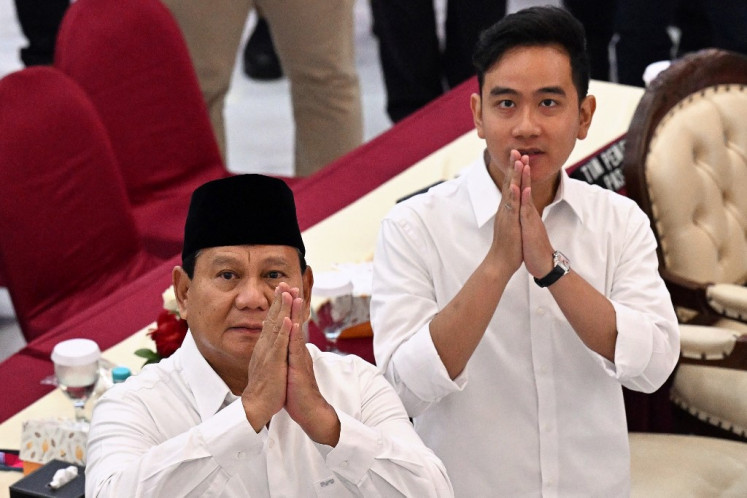In search of better industrial policy in Indonesia
Recently, Indonesiaâs economic indicators show some signs of moderation
Change Size

R
ecently, Indonesia's economic indicators show some signs of moderation. For instance, the economy only grew by 6 percent during quarter 1 (Q1) 2013, down from 6.2 percent in quarter 4 (Q4) 2012. This figure was slightly lower than the government's initial projection.
One of the factors of this economic moderation is Indonesia's high dependence on commodity exports.
During the commodities boom in the 2000s, Indonesia has been exporting commodities such as coal and crude palm oil on a massive scale to meet demands from emerging economies such as China and India.
Since mid 2012, however, sluggish global economic conditions resulted in declining commodity prices and affected Indonesia's export performance. In the end, this resulted in slower economic growth.
In short, this condition shows that Indonesia's current economic model of commodity-propelled economic growth is not sustainable and very vulnerable to commodity price volatility.
Meanwhile, the industrial sector is usually a better propeller for economic growth, since it is a relatively less volatile sector. In addition, it creates huge employment opportunities (particularly that with labor-intensive approach), which is good for Indonesia's enormous population size. It also brings more value-added and positive externalities to the economy.
Unfortunately, Indonesia's industrial sector has not been performing well in the recent quarters.
Based on data released by Statistics Indonesia, Indonesia's manufacturing industry shrunk by 1.7 percent in Q1 2013 compared to Q4 2012. Moreover, manufacturing industry share in terms of total gross domestic product (GDP) was only around 24 percent in Q1 2013, fell slightly from 25 percent in Q4 2012. In terms of productivity, industrial production index has also declined slightly in Q1 2013 to 113.8 from 114.12 in Q4 2012.
These statistics, even though not conclusive, show a tendency of industrial stagnation. If this occurs in the long run, Indonesia might experience early 'de-industrialization', which is highly undesirable.
Fortunately, the government has realized this issue and has been trying to promote industrialization once again. It has implemented several policies such as restrictions on exports of mining products and anti-dumping duty on steel imports. These restrictions are expected to give incentives to local manufacturers to substitute imports and bring more value added to the output by recreating the whole production chain locally.
However, if we look at these policies closely, it seems like the government is adopting an import-substitution industrialization (ISI) strategy considering its main aim is to try to replace foreign imports with domestic products.
An ISI strategy, which is to some extent, theoretically justified, has several drawbacks. Replacing imported goods with domestic production takes some time to fully work. It is also very costly and may create inefficient and obsolete industries since they are not exposed to internationally competitive industries.
More importantly, this strategy is considered 'outdated' considering current global trends that focus on production efficiency. Hence, by implementing an ISI strategy too deeply, Indonesia will lose its attractiveness, which might reduce foreign direct investment (FDI) in Indonesia.
Meanwhile, a study by Meixell and Gargeya (2005) suggests that current international manufacturers are more interested in reducing cost, increasing revenue, and improving reliability. This paradigm shift has made 'global production chain' manufacturing a more desirable and cost efficient manufacturing model.
In the global production chain model, each country focuses on a particular production chain in order to maximize productivity and improve cost efficiency. Then, this production is integrated globally in order to produce a complete product.
Therefore, instead of trying to focus too much on creating the whole production chain for one particular product, Indonesia's government should pay more attention on product specialisation and production efficiency in order to take part in the global production chain.
Product specialization does not necessarily lead to less value added in the production process. A traditional measurement of value added usually estimates per-unit difference between revenues and costs related to production. The government's current industrial policy is too focused on this traditional measurement.
However, as suggested by Lejour et al. (2012), new arrangements in international production have changed the rational of measuring production value added. As an alternative of the traditional measurement, value added can be measured by estimating total value added of production activity.
In other words, even though the government focuses on the specialization of one particular production chain instead of producing the whole manufacturing process, it does not necessarily lead to lower value added. In fact, efficient product specialization might lead to the same or higher amount of total value added.
The government can enhance this industrialization model by creating and directing one particular industry, which is relatively more efficient with lower cost , to be more specialized in one particular production chain in order to integrate it into global production chains.
In addition, this should be supported by adequate infrastructure, encouraging investment and favorable industrial regulations. Through these efforts, hopefully this model of industrialization will be able to revive Indonesia's stagnating industrial sector and create more sustainable economic growth.
The writer is a research analyst at a multinational bank. The opinions expressed are his own.









